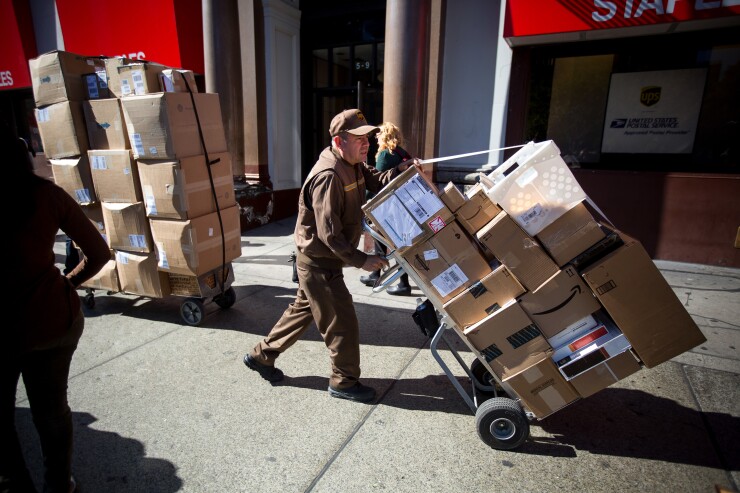Blame Colorado.
Beginning in 2022, the state began imposing a retail delivery fee on retail sales of tangible personal property delivered by motor vehicle to a location in the state. In order to apply, the sale had to include at least one item of tangible personal property subject to sales or use tax. The retailer is required to collect the retail delivery fee from the purchaser and remit the fee to the Colorado Department of Revenue.
The fee came at least partially in response to the increase in online sales and deliveries that occurred during the pandemic. It not only generates tax revenue, but also addresses the issue of the effect on the environment of such deliveries.
"With motor fuel tax revenue on the decline as more drivers switch to electric and hybrid vehicles, retail delivery fees could become an essential source of funding for road and transportation projects," observed Gail Cole, senior content writer at tax compliance solution provider Avalara.
And the Colorado statute notes that the increasing number of delivery vehicles will "increase motor-vehicle-related emissions of air pollutants … that contribute to adverse environmental effects, including but not limited to climate change, and adverse human health effects."
Significantly, Minnesota and New York are now proposing their own retail delivery fees, similar to the Colorado statute. In fact, Minnesota is looking at raising its proposed retail delivery fee from 40 to 75 cents.
Not surprisingly, the Colorado fee has drawn criticism from the business community, according to Scott Peterson, vice president of U.S. tax policy and government relations for Avalara.
"The fee has to be reported on a separate return, so every retailer has to file two tax returns monthly — one for sales tax, and another return just for the delivery fee — that's a big step backward in simplification."
Another complaint is that the fee must be separately itemized on the invoice, according to Peterson. "The law says you have to charge consumers 27 cents," he said. "To be able to charge someone, you have to put it on the invoice. It turns out that there is a lot of invoice software that's not easy to change or modify. Pending legislation in Colorado would allow businesses to not put the delivery fee on the invoice by paying the fee but not charging the customer."
There is no upper limit on how much Colorado can charge. The fee will increase to 28 cents on July 1, 2023. There are six state agencies that have an input into the fee. "Each agency gets to charge their part of the fee," said Peterson. "It's a cumulative number imposed by the six agencies."
Both the Minnesota and New York proposals are patterned after the Colorado statute, he indicated. But the Minnesota proposal has the potential to create confusion, he suggested.

"Minnesota doesn't tax clothing, so if an out-of-state retailer sells nothing but clothing in Minnesota, they don't need a sales tax license," said Peterson. "However, even though they don't collect sales tax in Minnesota, they will have to collect the retail delivery fee under the proposal. It could come as a surprise to some of them."
Relief may be on the way for small businesses in Colorado. On April 14, the Colorado House Appropriations Committee passed S.B. 143, which would exempt businesses with less than $500,000 in annual retail sales in the state from the retail delivery fee. The bill further modifies the administration of the fee by permitting a retailer to pay the fee on behalf of the purchaser. If the retailer elects to pay the fee, then they are not required to add the price of the retail delivery, separately itemize the fee, or collect the fee from the purchaser, who is not liable for the amount nor eligible for a refund of an erroneously paid fee, according to the legislative summary.
Peterson predicts that other states will consider the retail delivery fee.
"If the push for e-vehicles continues, states will need to replace lost funds from gas tax for highway improvements," he said. "The tipping point will come when states need to go in a different direction to shore up funds for highway improvement."





